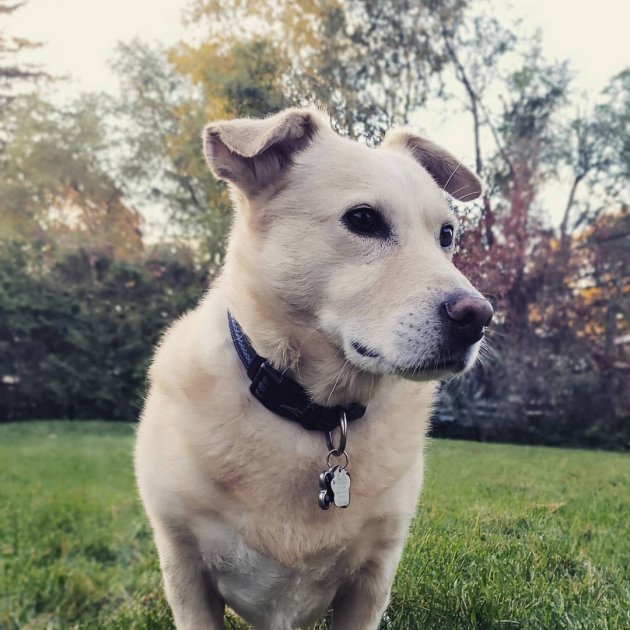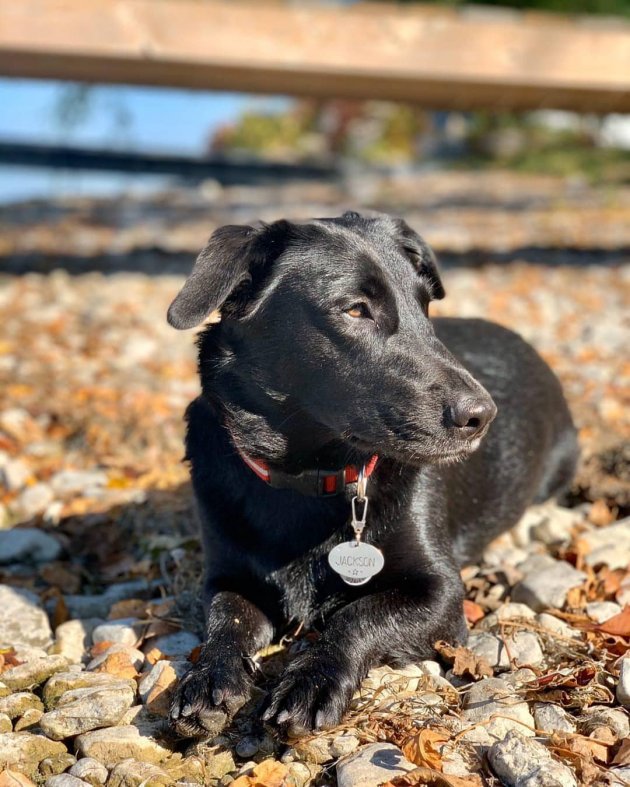Even though the Corgi/Labrador Retriever is not an officially recognized breed, the “Corgidor” is a popular hybrid that is winning the hearts of dog-lovers all over the world.
As with any crossbreed (or purebred, for that matter), every dog comes with its own physical traits, temperament, medical concerns, and things you will need to do to keep it healthy and happy.
Let’s “dig” into the world of the Corgidor to find out what you can expect with one of these unique pooches.
Corgidor History
We don’t know a lot about the history of the Corgidor, but there is speculation that it is a much older crossbreed than once thought. The Corgidor was most likely bred starting in the early 1900s for herding. And even though it is not a recognized breed by the American Kennel Club (AKC), it has been given the nod by the Dog Registry of America.

What Does a Corgidor Look Like?
At first glance, you may think the Corgidor is an odd-looking dog. This is because it has the larger head of a Labrador Retriever and the signature short legs of the Corgi. However, how “disproportionate” each Corgidor is will depend on the parents and its genetic lineage.
Most Corgidors will have the squarish head, almond-shaped eyes, and long muzzle classic of the Lab. Its ears may be slightly smaller, set high on the dog’s head, but may fall slightly. This hybrid is also shorter than it is in length with varying weights and heights depending on its parents.
Distinctive Features at a Glance
- Short legs in varying lengths
- Slightly drooping ears
- Disproportionate head
- Different tail lengths
Weight and Size
Because genetics is a fickle thing, the weight, and size of each Corgidor can vary depending on the weight and size of the parents. On average, Corgidors weigh between 40 and 50 pounds, putting them as a medium-size pooch. The height will also vary from the shorter-legged “model” of twelve inches at the shoulder up to 23 inches.
Corgidor Coat
The coat of the Corgidor will be a mix of both its parents. Therefore colors will vary. However, the most common coat colors are red, brown, black, and tan. The coat can be solid or even a mix of two colors reminiscent of the Corgi’s white chest and belly. The fur is dense and is short to medium in length.
Fun Facts About the Corgidor
Here are some cool facts about the Corgidor you may not have known;
- This hybrid is both a companion and a watchdog.
- The Corgidor has relatively good muscle mass from its Lab lineage
- The short legs of this pooch don’t slow it down - it is still very athletic.
- Corgidors are very observant
- This hybrid can get along well with both children and other animals.
Watch this active Corgidor play fetch!
The Temperament of the Corgidor
The Corgidor will extract its personality from both the Corgi and the Labrador Retriever. For this hybrid, you can expect it to have some of the protectiveness of Corgi, so it makes an excellent watchdog. It loves children like the Lab and thrives on being a part of the family unit. The Corgidor is also good-natured, loving, and loyal to a fault, so be sure to give this pooch lots of love and attention.
Health Concerns
The Corgidor may be prone to the same health issues as its parents. However, while most are generally healthy, you will want to be aware of the following conditions.
- Eye Problems - such as retinal dysplasia, blindness, and eyelash issues.
- Joint Dysplasia - such as in the elbows, or hips.
- Ear infections
- Back problems - because this hybrid has an elongated back, it could suffer from back problems such as a slipped disc.
- Obesity
- Skin Issues - such as dermatomyositis.
Lifespan
Although the above list of health concerns may affect some Corgidors, they are a relatively healthy mixed breed. Pet parents will be happy to know their lifespan is from 10 to 15 years; however, that may still seem too short for devoted dog-lovers.

Corgidor Maintenance
To have a healthy, happy Corgidor, you will need to provide your pooch with a proper diet, exercise, and grooming. Regular checkups with your veterinarian and annual vaccinations will also keep your Corgidor in tip-top shape, and will help prevent, or catch, any of those health concerns we mentioned earlier before they become a serious issue.
Food & Water
Ideally, your Corgidor should eat a nutritious, balanced diet formulated for medium-sized dogs. Look for a recipe that contains real meat as the first ingredient, with added vitamins, minerals, fruits, and vegetables. Dog kibble loaded with fillers like by-products meals and excessive grains can pack on those added pounds, so avoid these foods.
Pet parents of Corgidors know these cross-breeds do tend to put on weight, so keep fatty treats and people food to a minimum, and be sure not to leave out dry kibble (free-feed) your Corgidor.
Remember, your Corgidor’s feeding needs will change from puppyhood to adulthood, to being a senior, so adjust his diet accordingly.
The Corgidor does tend to overheat very quickly, so always have fresh, cool water available both in your home and when you are out for walks, especially in the warmer months.
Exercise
Despite their short-legged stature, Corgidors are very active dogs. They need at least 30 minutes of exercise each day. This includes brisk walks, hiking, and play sessions in the backyard, or dog park, or active play sessions with a lengthy walk. Break your dog’s activity up into a couple of sessions to make the most out of his daily exercise needs.
Grooming
The Corgidor has inherited the “shedding” gene from both the Lab and the Corgi, so you can expect to be brushing this dog’s fur at least once a week (more in the Spring and Autumn months).
Part of grooming your Corgidor is to check its ears for pests, or debris each day, then clean when necessary with a cotton ball. This hybrid also has very fast-growing nails, so be sure to keep those trimmed to avoid overgrowing (you will know they are too long if you can hear them clicking on the floor).
Good oral hygiene is not just a people-thing; your dog needs to have his teeth brushed daily to reduce plaque and tartar buildup, along with many other oral-related health issues.
If you are uncomfortable grooming your Corgidor, enlist the help of a dog groomer.
Conclusion
If you are looking for the qualities of both the Labrador Retriever and the Corgi all rolled into one short-legged pooch, then the Corgidor may be the dog for you. Before you adopt a Corgidor, be sure to research the breeder to ensure your dog is coming from a reputable kennel. If you would rather adopt a Corgi Lab mix, then check with your local rescue groups, social media, or the want ads. Corgidors are fun-loving, devoted dogs that would make a great addition to any active household.